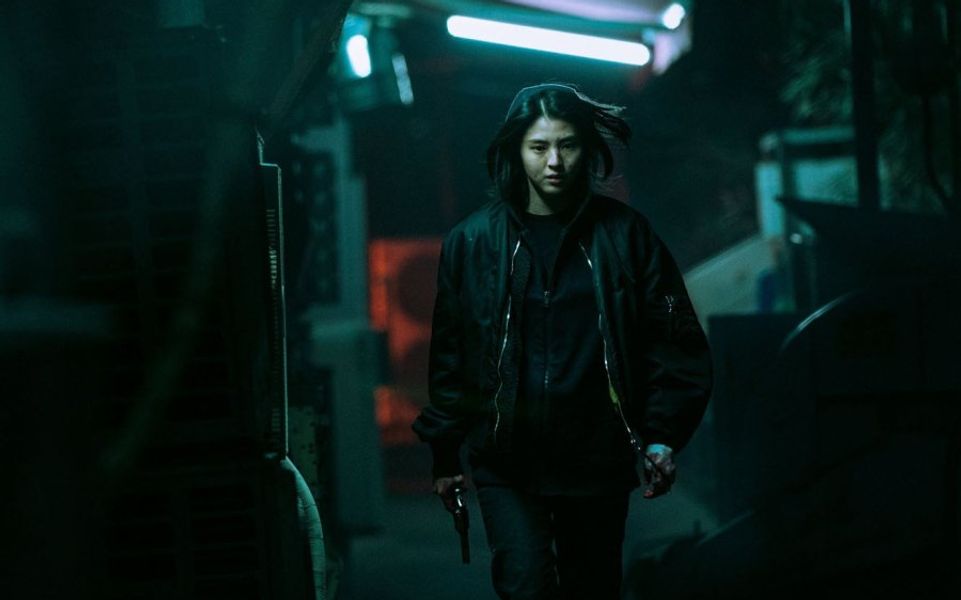After his much-acclaimed Netflix collaboration that dealt with the dark tale of high school students, Extracurricular, director Kim Jin-min struck a second deal with Netflix to create a pulpy action noir film with Han So-Hee in the lead. Imagine a cross-over between John Wick and Kill Bill where Quentin Tarantino’s Bride waltzed her way into the Wick-verse; it would result in My Name.
Following the massive success of the recent K-original survival thriller series Squid Game, My Name had a lot of expectations to live up to as the world, gripped by the Korean wave, looked up to it with eager eyes. And it surely did not disappoint. If you are a fan of thriller films and shows with strong female protagonists, you will love this Korean series. Han So-Hee sheds off her usual image of a petite beauty as seen in previous dramas like The World of the Married and Nevertheless to adopt a ruthless and badass facade.
The series revolves around Yoon Jiwoo, a high school student whose father is on the nation’s most-wanted list due to his involvement with the criminal underbelly and drug peddling.
Harassed by her classmates for her father’s criminal status, Jiwoo finally snaps on her 17th birthday and lashes out at her father, who is in hiding, on the phone. After her father is killed right on their doorstep by a mysterious, masked killer, Jiwoo is overtaken by the desire to avenge her father’s death, and she refuses to be stopped by the daunting obstacles that lie in her path. Joining forces with her father’s trusted associate Choi Mu-jin, Jiwoo becomes a snitch in the police force, adopting an alias to seek vengeance. However, the climb to the top is complex, and soon she is bombarded by various unwelcome truths.
The series has eight hour-long episodes that chronicle the story of Jiwoo exacting revenge. With well-stylised choreography and riveting action sequences, the dreadful scenes abound in blood, gore, grime and violence. Bare-faced and angry, the underlying rage in Jiwoo is evident on her face that sees a conglomeration of both vulnerability and anger. She is a volatile bomb waiting to explode. The guilt that resides in her prickly conscience is justified by the tragedy of her father’s betrayal. The ending of the series is satisfying. However, our heart aches for Pildo and his unrequited love story with Jiwoo.
Jiwoo brutally seeks justice. Yet, the audience cannot help but root for this girl whose cathartic journey from a naive teen to a fierce, headstrong woman is therapeutic. We cheer for her triumphs and wait with bated breath as Jiwoo waltzes her way out of difficult and impenetrable situations with unfathomable poise and swagger. Jiwoo’s struggle as a woman in an inherently male-dominated world sees her undergo insults and abuse as well as attempted sexual harassment. However, she never loses her way and stays put in her goals of finding and killing her father’s murderer. Han So-Hee, who is used to playing demure and shy melodramatic characters in K-Dramas, apparently performed all the action scenes on her own, adding authenticity to the gruelling premise. She never loses her raw and delicate side while lashing out against her opponent with unimaginable bravado and fight.
What sets the series apart from other action series is the emotional depth of the characters. The poignance of the story is seen through the profound flashbacks of Jiwoo. The relationship with her father keeps her going in such a ruthless world amidst cutthroat competition. Jiwoo continuously proves her worth and prevails despite all hardships. Despite the various dramatic sequences, the overall intriguing premise, wonderful performances — by the likes of Han So-Hee, Park Hee-Soon, Kim Sang-ho, Ahn Bo-Hyun and Lee Hak-Ju, among others — and the emotionally wrenching story has catapulted it up the charts and into the stratosphere of critical acclaim.
